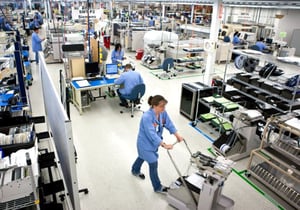In this special blog series, Digital Transformation & the Evolving Role of ERP, we’ll discuss ERP’s new place at the heart of Manufacturing’s digital transformation. From business analytics to artificial intelligence and the Internet of things (IoT), you’ll learn about the cutting-edge technologies disrupting how manufacturers do business.
 Like so many other industries, the manufacturing sector has been affected by competitive forces both domestic and abroad, largely driven by advancing technologies. To remain competitive, many manufacturers have had to redefine how they do business. Be it the product itself, the processes driving production or the partners and customers met along the way, the ERP system has become central to making operational improvements in the modern age.
Like so many other industries, the manufacturing sector has been affected by competitive forces both domestic and abroad, largely driven by advancing technologies. To remain competitive, many manufacturers have had to redefine how they do business. Be it the product itself, the processes driving production or the partners and customers met along the way, the ERP system has become central to making operational improvements in the modern age.
Here are three manufacturing trends we expect to only strengthen in 2018 – thanks in large part to ERP software.
1. Automation
The manufacturing industry has made tremendous strides in automation in the last decade. Not every manufacturer is equipped with the latest specialized technologies, but companies with a modern ERP system are able to use built-in automation tools to set several manual processes to auto-pilot. The effectiveness of ERP-enabled automation has only increased as ERP software becomes “smarter.” Many ERP platforms are now equipped to analyze how users navigate the system and make recommendations on how to automate processes even further to fit a user’s usage behaviors.
Altogether, this means fewer man-hours spent on mundane, labor-intensive tasks and more time freed up for cognitive functions and mission-critical activities.
2. Strategic Service Arrangements
As manufacturers look for new ways to increase efficiency and ramp up productivity, more support services are being outsourced rather than handled in-house. In addition to payroll and marketing, one of the major items on this list is IT. Cloud-enabled ERP systems allow manufacturers to hand the software maintenance reins over to a trusted software-as-a-service (SaaS) vendor. Engaging in this sort of long-term service arrangement rather than cutting ties after launch allows your ERP partner to become a valuable resource in how you think about your processes and your business. As manufacturing businesses are “digitally transformed” and more technologies are added, SaaS partners can help manufacturers work through integration challenges – and recognize new, tech-driven business opportunities in the process.
3. Globalization
Today’s supply chains are no longer limited by the logistical hindrances of the past. Products and source materials can be delivered across the globe more quickly and economically than ever before.
With this change comes the need to also gather and access data from various locations. Cloud-enabled ERP has opened new doors for manufacturers with multiple facilities. Now, ERP software can be universally deployed in a matter of clicks, with each instance customized for local considerations like language and currency. Once in place, data is synced in real-time from multiple sites so both global employees and global partners can access up-to-date design and distribution information, no matter where they are.

